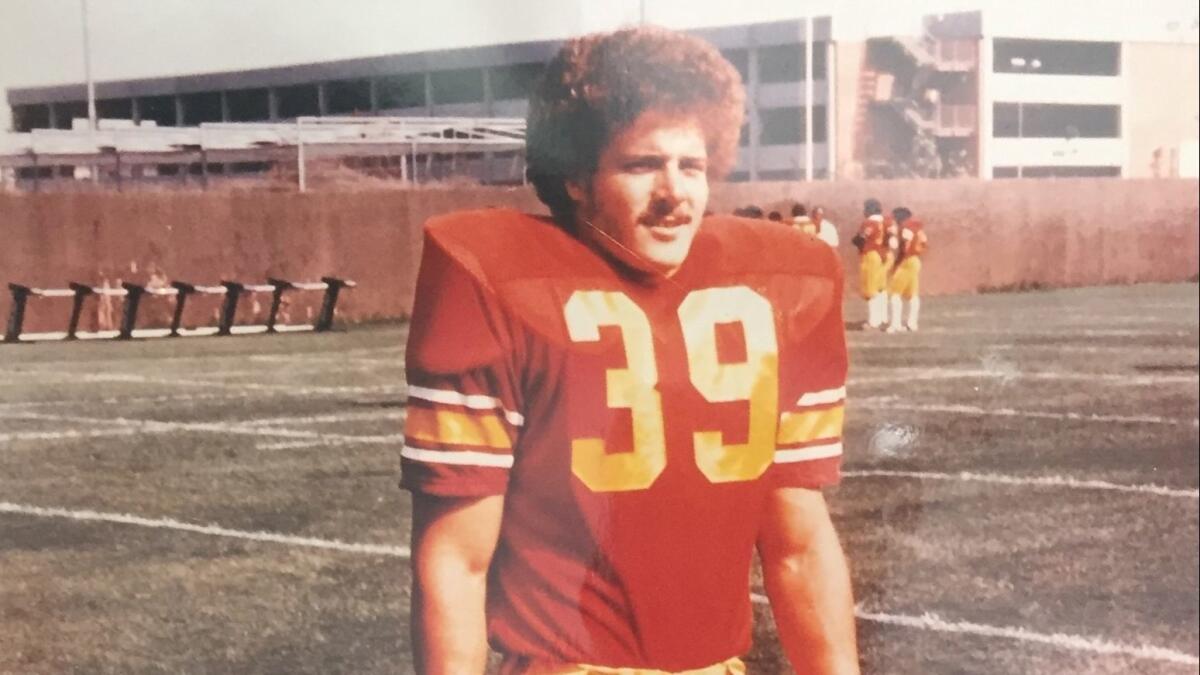Wrongful death lawsuits filed against NCAA on behalf of former USC and UCLA football players

- Share via
Family members of former USC fullback Douglas MacKenzie and former UCLA running back Rodney Stensrud have filed wrongful death lawsuits against the NCAA in Los Angeles County Superior Court.
The complaints are among the first in a wave of suits expected to be filed against the NCAA and its conferences and universities in the coming months, that allege the sport’s governing body did not properly inform college football players of the risks of head injuries and the impact that traumatic brain injury could have on their long-term quality of life.
MacKenzie, who played for USC from 1978 to 1981, worked in construction after his football career until a stroke in 2016 limited his activity. He died in February at age 59. The complaint, filed Friday by his mother, Dorothy MacKenzie-Schmidt, states that MacKenzie suffered from memory loss, delirious periods, tremors in his hands and depression.
Stensrud, who played for UCLA from 1969 to 1972 and Long Beach State from 1972 to 1973, worked as a high school sociology teacher after his football career. The complaint, filed Monday by his widow, Diantha Stensrud, states that in his mid-40s, Stensrud became emotionally volatile, forgetful, disoriented, paranoid and suffered hallucinations. He was diagnosed with Alzheimer’s disease at 55 and died in 2011 at age 60. An autopsy revealed he had chronic traumatic encephalopathy (CTE), a degenerative brain disease that has been discovered in more than 100 deceased former football players.
The family members are seeking compensation for the untimely deaths of their loved ones, including medical expenses incurred. They also specify a demand for a jury trial.
“Our goal is to take these to trial,” said Jay Edelson, the founder and chief executive of Edelson PC, the Chicago-based law firm that is representing the plaintiffs in these cases. “Our clients want to get in front of a jury. We think a jury is going to act very favorably to the stories that they have, and we want to get there as soon as we can.”
Two other Edelson PC clients filed suits Monday. Sarah Staggs, the widow of former San Diego State and San Diego Chargers linebacker Jeffrey Staggs, filed a complaint on his behalf in the U.S. District Court for the Southern District of California. Staggs died in 2014 at age 70 and was revealed to have been living with CTE.
Jennifer Finnerty, the widow of former Grand Valley State (Michigan) quarterback Cullen Finnerty, filed a complaint on his behalf in the Superior Court of Marion County in Indiana. Finnerty died in 2013 at age 30 and also had CTE.
The suits come in the wake of the NCAA settling with former University of Texas lineman Greg Ploetz’s widow, who filed a lawsuit that made the same accusations. The suit was settled in June after three days of trial.
Edelson said the MacKenzie, Stensrud, Staggs and Finnerty cases are the first of many his firm, which specializes in class- and mass-action suits, will be filing against the NCAA. He said conferences and universities would be sued in the future and that his intention is to try each case individually and not pursue a class action. Edelson hopes judges will begin hearing the cases in 2019.
He expressed disappointment that the Ploetz case, as the first wrongful death lawsuit related to CTE to go to trial against the NCAA, did not reach a verdict.
“In order for the NCAA to really understand the scope of what they’re dealing with, we’re probably going to have to try a bunch of these cases and get verdicts,” Edelson said. “And in terms of whether that will lead to a global resolution, I am not sure we will be able to do that without trying 20, 40, 60 cases.”
Edelson said the NCAA could not have asked for a more favorable situation in which to go to trial than that of the Ploetz case, given that it was heard in Texas, where football is king.
“The NCAA wants to make these cases about whether football is good, which is not what the cases are about,” Edelson said. “We all love football. It’s about whether the players ought to be protected and given information. Even with a jury that I think was as ideal as the NCAA could pick, they still did not want it to go to verdict. We were definitely informed by that.”
The NCAA could not be reached for comment.
The families of MacKenzie and Stensrud expressed in a statement to the Los Angeles Times that their complaints serve a bigger purpose than restitution.
“Our family has filed this lawsuit against the NCAA to make a difference,” MacKenzie-Schmidt said. “Too many football players have gone on to develop brain disease, including my son Doug, and the time for change has come. We want football to be as safe as it can be, and we want student-athletes to be aware of the terrible consequences that concussions early on can have throughout their lives.”
Said Stensrud: “My husband’s death at age 60 due to brain disease robbed us of so many more years together. I don’t want that to ever happen to anyone else. … It is my hope that going forward the NCAA will be honest with student-athletes. I wish more than anything that they had been honest with Rodney.”
Twitter: @BradyMcCollough
More to Read
Fight on! Are you a true Trojans fan?
Get our Times of Troy newsletter for USC insights, news and much more.
You may occasionally receive promotional content from the Los Angeles Times.







